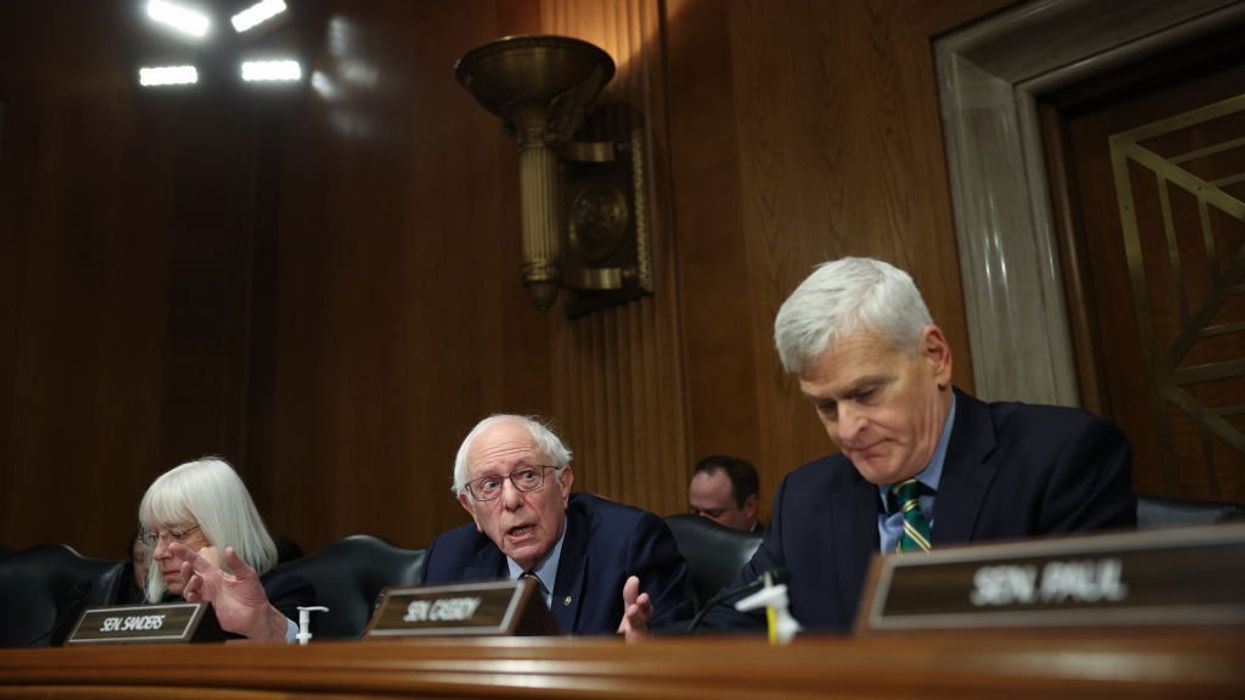WASHINGTON—Some Senate Democrats voiced concerns this week about damage to free speech due to a new law that would define antisemitism. However, several Democrats co-sponsored the bill with most Republicans.
“I worry that this bill is unconstitutional and will move us far along the authoritarian direction that the Trump administration is taking us,” said Sen. Bernie Sanders (I-Vt.) at Wednesday’s hearing in the Senate Health, Education, Labor and Pensions (HELP) Committee.
The bill would require the Department of Education to use the “ working definition ” of antisemitism, drafted by the International Holocaust Remembrance Alliance (IHRA) in 2016. Currently, the Department of Education has been using the same definition but has not been legally required to do so. This bill would change that.
Supporters of the bill argued that adding the definition would be an opportunity for the United States to show “that we are with those students that have been harassed, to reassure parents and their children as much as we can that they will be safe from discrimination, harassment, and even physical abuse,” said Sen. Bill Cassidy (R-La.), chair of the HELP committee.
Critics, however, argued the bill would crack down on free speech for students critical of Israel. They described the bill as part of the Trump administration’s broader effort to weaponize antisemitism, following protests at universities in the last few years.
The definition, which is considered “non-legally binding” by its creators, starts with: “Antisemitism is a certain perception of Jews, which may be expressed as hatred toward Jews.” It also includes 11 contemporary examples of what they say could be considered antisemitic. That list includes “making mendacious, dehumanizing, demonizing, or stereotypical allegations about Jews as such or the power of Jews as collective” and “drawing comparisons of contemporary Israeli policy to that of the Nazis.”
During the hearing, Sen. Tim Scott (R-S.C.) argued that the bill protects free speech but punishes harmful actions that follow speech. But Sen. Rand Paul (R-Ky.) rejected that as violating the First Amendment right to free speech.
“Every example of antisemitism in that list is about words, not action. You can’t regulate speech,” Paul said. “The First Amendment is not about protecting good speech. In Brandenburg v. Ohio, Brandenburg was a Nazi and an antisemitic who said horrible things. The Supreme Court ruled that you can say terrible things.”
In an open letter to Congress, 10 pro-Israel organizations expressed concern about the potential passage of the Antisemitism Awareness Act.
“Voting in favor of this legislation in this current political climate would represent an endorsement of the Trump administration’s escalating efforts to weaponize antisemitism as a pretext for undermining civil rights, deporting political dissidents, and attacking the fundamental pillars of our democracy, making the Jewish community and others less safe,” the groups wrote.
“I think the bill is very restrictive, but the fundamental problem is that no one could tell you what it means,” said Douglas Laycock, an emeritus law professor at the University of Virginia and an expert on religious liberty and the First Amendment. “The ‘certain perception of Jews’ that the definition talks about is not described and not defined. If I gave you the text of a speech I was about to give, no one could tell me if I’m violating the law. ‘Unconstitutionally vague’ is also one of the problems here.”
In a statement posted on their website in February, after House Republicans reintroduced the bill in their branch, Anti-Defamation League CEO Jonathan Greenblatt said in a statement that “the Antisemitism Awareness Act reinforces federal policy and ensures the IHRA Working Definition of Antisemitism remains the standard for addressing antisemitic discrimination in education. I urge Congress to act now and pass this vital, bipartisan bill.”
Kenneth Stern, director of the Bard Center for the Study of Hate at Bard College and one of the lead authors of the definition, spoke in front of the House Judiciary Committee last September. He said that while the working definition had examples related to Israel because there was “a correlation between such expressions and level of antisemitism,” it was never intended to “target or chill speech in a college campus.”
Wednesday’s Senate hearing ended without a vote on the bill, but the committee adjourned and will resume its work on the bill in the future. An Anti-Defamation League spokesperson said to the Jewish Insider that they are “committed to pursuing every possible avenue to advance this important bill and will continue working with our bipartisan partners in Congress to see it signed into law.”
Leonardo Pini is a graduate student at the Medill School of Journalism at Northwestern University, specializing in politics, policy, and foreign affairs. Born and raised in Italy, he worked professionally for the local edition of Italy’s national outlet “la Repubblica”, covering crime news. He also freelanced for “L’Espresso” magazine on foreign affairs and social issues. He produced two podcasts for RAI Radio, an Italian state radio, on asylum patients and assisted suicide. During his time at Medill, he was a fellow at Capitol News Illinois reporting on Illinois’ legislation.




















Marco Rubio is the only adult left in the room